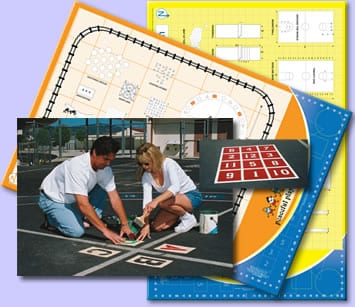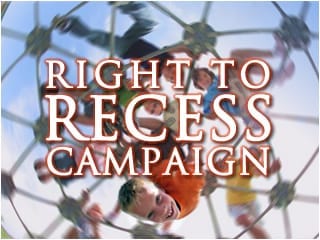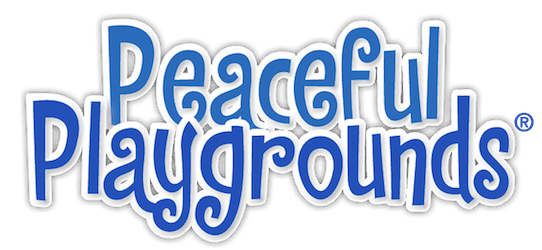Playground Safety and Design Resources


Peaceful Playgrounds Unique Game Markings and Designs
Use these playground resources for improving your school playground and making it safer for students.
Design permanent playground activities that help make activity time more positive and productive. Alphabet and number grids, hopping and skipping lines, and multi-use circles and squares are just a few of the nearly 100 activities that can be added. The program is intended to maximize the number of students involved in physical activity, rather than having them wait in line, or just stand around talking.
Principal Shalhoub said,
We've had a great response to the new playground. The kids love it, the parents love it.
Murrieta Springs Charter School.
Tired of Playground Hassles and Headaches?
In addition to using books and magazines to find out about playgrounds, use the power of the Internet for other playground resources? The links below are a starting point with information on safety, school playgrounds, kids websites, playground design and information for parents.
For more information on playground safety, contact The Consumer Product Safety Commission at (800) 638- 2772 or www.cpsc.gov . You can view the "Handbook for Playground Safety" (pdf) and the "Public Playground Safety Checklist" or get a free copy by writing to CPSC, Washington, DC 20207.

Playground Safety
Safe Kids Playground Tips.
Public Playground Safety Checklist
Use this simple checklist to help make sure your local community or school playground is a safe place to play.
National Program Playground Safety
General tips and guidelines for planning a safe play area for children. S-A-F-E tips and guidelines: Supervision, Age-Appropriate design, Fall surfacing, and Equipment maintenance are explored.
KaBoom
Works nationally to ensure playground equity.
NASPE Position Statement on Dodgeball
According to NASPE dodgeball is not an appropriate activity for K-12 school physical education programs. The purpose of physical education is to provide students with:
1) The knowledge, skills, and confidence needed to be physically active for a lifetime.
2) A daily dose of physical activity for health benefits and
3) Positive experiences so that kids want to be physically active outside of physical education class and throughout their lifetime.
Some kids may like it–the most skilled, the most confident. But many do not. Certainly not the student who gets hit hard in the stomach, head, or groin. And it is not appropriate to teach our children that you win by hurting others.







